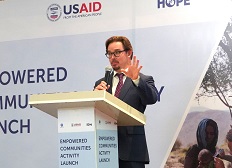The United States launched a new program that will engage Ethiopian communities in health-related decision-making, to improve knowledge and understanding of their rights, available services, and fee structures, so that they can manage their own health.
The $35 million dollar project is designed to ensure that all community members, including the most marginalized, have access to Reproductive, Maternal, Neonatal, Child and Adolescent services by enhancing services in private and independent health facilities.
It will be implemented over four years and is called the USAID Empowered Communities Activity. It will work with the Ministry of Health to build the capacity of civil society organizations, community-based organizations, faith-based organizations, and private sector actors for more transparent, responsive, and accountable health services.
The new activity was launched in Addis Ababa, and was attended by USAID/Ethiopia’s Deputy Mission Director Tim Stein, Dr Ruth Nigatu, Chief of Staff to Minister of Health, Executive Vice President of Project Hope Chris Skopec, regional health bureaus, donor agencies, development partners, UN and civil society organizations, and academia and the private sector, among others, according to the statement from USAID.
“Over the past decades, USAID has worked with partners to strengthen Primary Health Care in Ethiopia. For 120 years, the United States and Ethiopia have partnered in health and education, agriculture and food security, science and the environment, and many other areas to improve the lives of all Ethiopians,” the statement indicated.

